Cardiovascular Disease Prevention: A Mediterranean Diet Analysis
VerifiedAdded on 2023/04/25
|7
|2000
|337
Report
AI Summary
This report provides a comprehensive analysis of a study investigating the primary prevention of cardiovascular disease through a Mediterranean diet supplemented with extra-virgin olive oil or nuts. The research, conducted in Spain, involved participants at high cardiovascular risk but without existing cardiovascular disease, who were randomly assigned to one of three diets: a Mediterranean diet with extra-virgin olive oil, a Mediterranean diet with mixed nuts, or a control diet. The study aimed to assess the impact of these dietary interventions on cardiovascular events. The report details the study's design, methods, and results, including the efficacy of the dietary supplements in reducing blood pressure, myocardial infarction risk, and mortality rates. Furthermore, the report examines the mechanisms through which the Mediterranean diet, particularly the benefits of extra-virgin olive oil and nuts, contributes to cardiovascular health. The analysis highlights the importance of dietary interventions in reducing cardiovascular disease risk and improving overall health outcomes, especially among the elderly population. The data was collected using relevant research articles and peer-reviewed journals from famous websites. The analysis also includes limitations and strengths of the study. The report concludes with a discussion of the findings and their implications for public health and clinical practice.
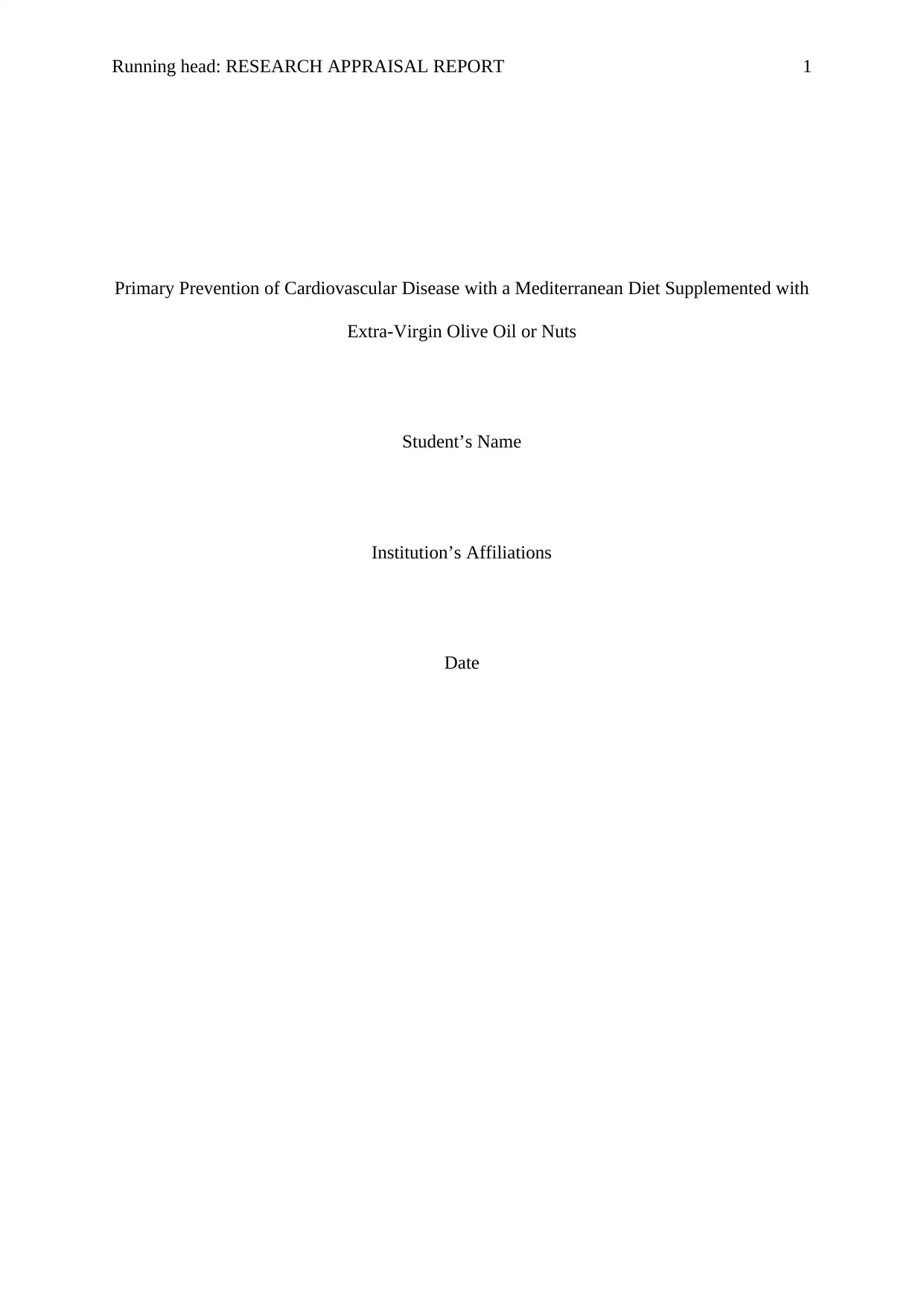
Running head: RESEARCH APPRAISAL REPORT 1
Primary Prevention of Cardiovascular Disease with a Mediterranean Diet Supplemented with
Extra-Virgin Olive Oil or Nuts
Student’s Name
Institution’s Affiliations
Date
Primary Prevention of Cardiovascular Disease with a Mediterranean Diet Supplemented with
Extra-Virgin Olive Oil or Nuts
Student’s Name
Institution’s Affiliations
Date
Paraphrase This Document
Need a fresh take? Get an instant paraphrase of this document with our AI Paraphraser
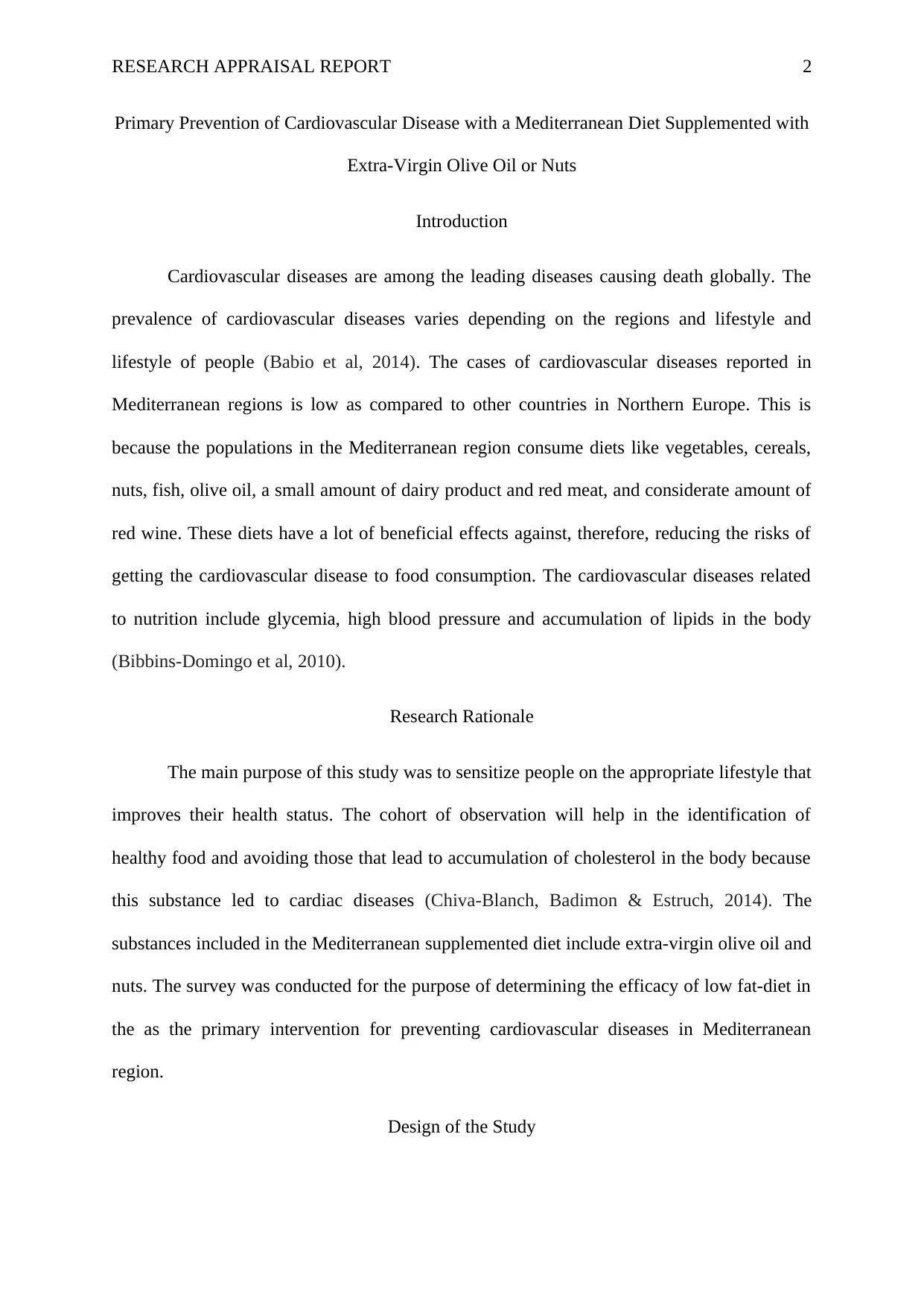
RESEARCH APPRAISAL REPORT 2
Primary Prevention of Cardiovascular Disease with a Mediterranean Diet Supplemented with
Extra-Virgin Olive Oil or Nuts
Introduction
Cardiovascular diseases are among the leading diseases causing death globally. The
prevalence of cardiovascular diseases varies depending on the regions and lifestyle and
lifestyle of people (Babio et al, 2014). The cases of cardiovascular diseases reported in
Mediterranean regions is low as compared to other countries in Northern Europe. This is
because the populations in the Mediterranean region consume diets like vegetables, cereals,
nuts, fish, olive oil, a small amount of dairy product and red meat, and considerate amount of
red wine. These diets have a lot of beneficial effects against, therefore, reducing the risks of
getting the cardiovascular disease to food consumption. The cardiovascular diseases related
to nutrition include glycemia, high blood pressure and accumulation of lipids in the body
(Bibbins-Domingo et al, 2010).
Research Rationale
The main purpose of this study was to sensitize people on the appropriate lifestyle that
improves their health status. The cohort of observation will help in the identification of
healthy food and avoiding those that lead to accumulation of cholesterol in the body because
this substance led to cardiac diseases (Chiva-Blanch, Badimon & Estruch, 2014). The
substances included in the Mediterranean supplemented diet include extra-virgin olive oil and
nuts. The survey was conducted for the purpose of determining the efficacy of low fat-diet in
the as the primary intervention for preventing cardiovascular diseases in Mediterranean
region.
Design of the Study
Primary Prevention of Cardiovascular Disease with a Mediterranean Diet Supplemented with
Extra-Virgin Olive Oil or Nuts
Introduction
Cardiovascular diseases are among the leading diseases causing death globally. The
prevalence of cardiovascular diseases varies depending on the regions and lifestyle and
lifestyle of people (Babio et al, 2014). The cases of cardiovascular diseases reported in
Mediterranean regions is low as compared to other countries in Northern Europe. This is
because the populations in the Mediterranean region consume diets like vegetables, cereals,
nuts, fish, olive oil, a small amount of dairy product and red meat, and considerate amount of
red wine. These diets have a lot of beneficial effects against, therefore, reducing the risks of
getting the cardiovascular disease to food consumption. The cardiovascular diseases related
to nutrition include glycemia, high blood pressure and accumulation of lipids in the body
(Bibbins-Domingo et al, 2010).
Research Rationale
The main purpose of this study was to sensitize people on the appropriate lifestyle that
improves their health status. The cohort of observation will help in the identification of
healthy food and avoiding those that lead to accumulation of cholesterol in the body because
this substance led to cardiac diseases (Chiva-Blanch, Badimon & Estruch, 2014). The
substances included in the Mediterranean supplemented diet include extra-virgin olive oil and
nuts. The survey was conducted for the purpose of determining the efficacy of low fat-diet in
the as the primary intervention for preventing cardiovascular diseases in Mediterranean
region.
Design of the Study
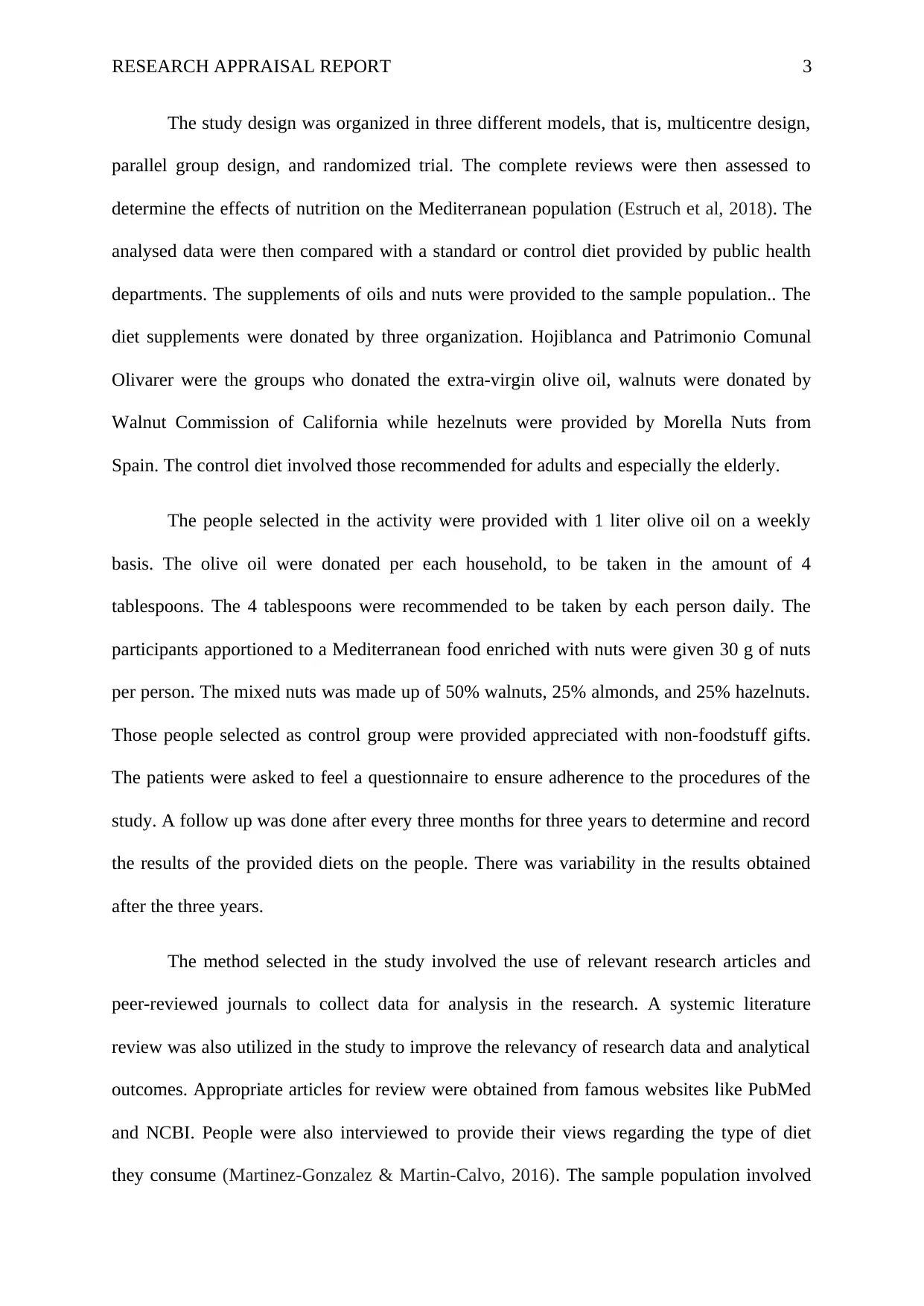
RESEARCH APPRAISAL REPORT 3
The study design was organized in three different models, that is, multicentre design,
parallel group design, and randomized trial. The complete reviews were then assessed to
determine the effects of nutrition on the Mediterranean population (Estruch et al, 2018). The
analysed data were then compared with a standard or control diet provided by public health
departments. The supplements of oils and nuts were provided to the sample population.. The
diet supplements were donated by three organization. Hojiblanca and Patrimonio Comunal
Olivarer were the groups who donated the extra-virgin olive oil, walnuts were donated by
Walnut Commission of California while hezelnuts were provided by Morella Nuts from
Spain. The control diet involved those recommended for adults and especially the elderly.
The people selected in the activity were provided with 1 liter olive oil on a weekly
basis. The olive oil were donated per each household, to be taken in the amount of 4
tablespoons. The 4 tablespoons were recommended to be taken by each person daily. The
participants apportioned to a Mediterranean food enriched with nuts were given 30 g of nuts
per person. The mixed nuts was made up of 50% walnuts, 25% almonds, and 25% hazelnuts.
Those people selected as control group were provided appreciated with non-foodstuff gifts.
The patients were asked to feel a questionnaire to ensure adherence to the procedures of the
study. A follow up was done after every three months for three years to determine and record
the results of the provided diets on the people. There was variability in the results obtained
after the three years.
The method selected in the study involved the use of relevant research articles and
peer-reviewed journals to collect data for analysis in the research. A systemic literature
review was also utilized in the study to improve the relevancy of research data and analytical
outcomes. Appropriate articles for review were obtained from famous websites like PubMed
and NCBI. People were also interviewed to provide their views regarding the type of diet
they consume (Martinez-Gonzalez & Martin-Calvo, 2016). The sample population involved
The study design was organized in three different models, that is, multicentre design,
parallel group design, and randomized trial. The complete reviews were then assessed to
determine the effects of nutrition on the Mediterranean population (Estruch et al, 2018). The
analysed data were then compared with a standard or control diet provided by public health
departments. The supplements of oils and nuts were provided to the sample population.. The
diet supplements were donated by three organization. Hojiblanca and Patrimonio Comunal
Olivarer were the groups who donated the extra-virgin olive oil, walnuts were donated by
Walnut Commission of California while hezelnuts were provided by Morella Nuts from
Spain. The control diet involved those recommended for adults and especially the elderly.
The people selected in the activity were provided with 1 liter olive oil on a weekly
basis. The olive oil were donated per each household, to be taken in the amount of 4
tablespoons. The 4 tablespoons were recommended to be taken by each person daily. The
participants apportioned to a Mediterranean food enriched with nuts were given 30 g of nuts
per person. The mixed nuts was made up of 50% walnuts, 25% almonds, and 25% hazelnuts.
Those people selected as control group were provided appreciated with non-foodstuff gifts.
The patients were asked to feel a questionnaire to ensure adherence to the procedures of the
study. A follow up was done after every three months for three years to determine and record
the results of the provided diets on the people. There was variability in the results obtained
after the three years.
The method selected in the study involved the use of relevant research articles and
peer-reviewed journals to collect data for analysis in the research. A systemic literature
review was also utilized in the study to improve the relevancy of research data and analytical
outcomes. Appropriate articles for review were obtained from famous websites like PubMed
and NCBI. People were also interviewed to provide their views regarding the type of diet
they consume (Martinez-Gonzalez & Martin-Calvo, 2016). The sample population involved
⊘ This is a preview!⊘
Do you want full access?
Subscribe today to unlock all pages.

Trusted by 1+ million students worldwide
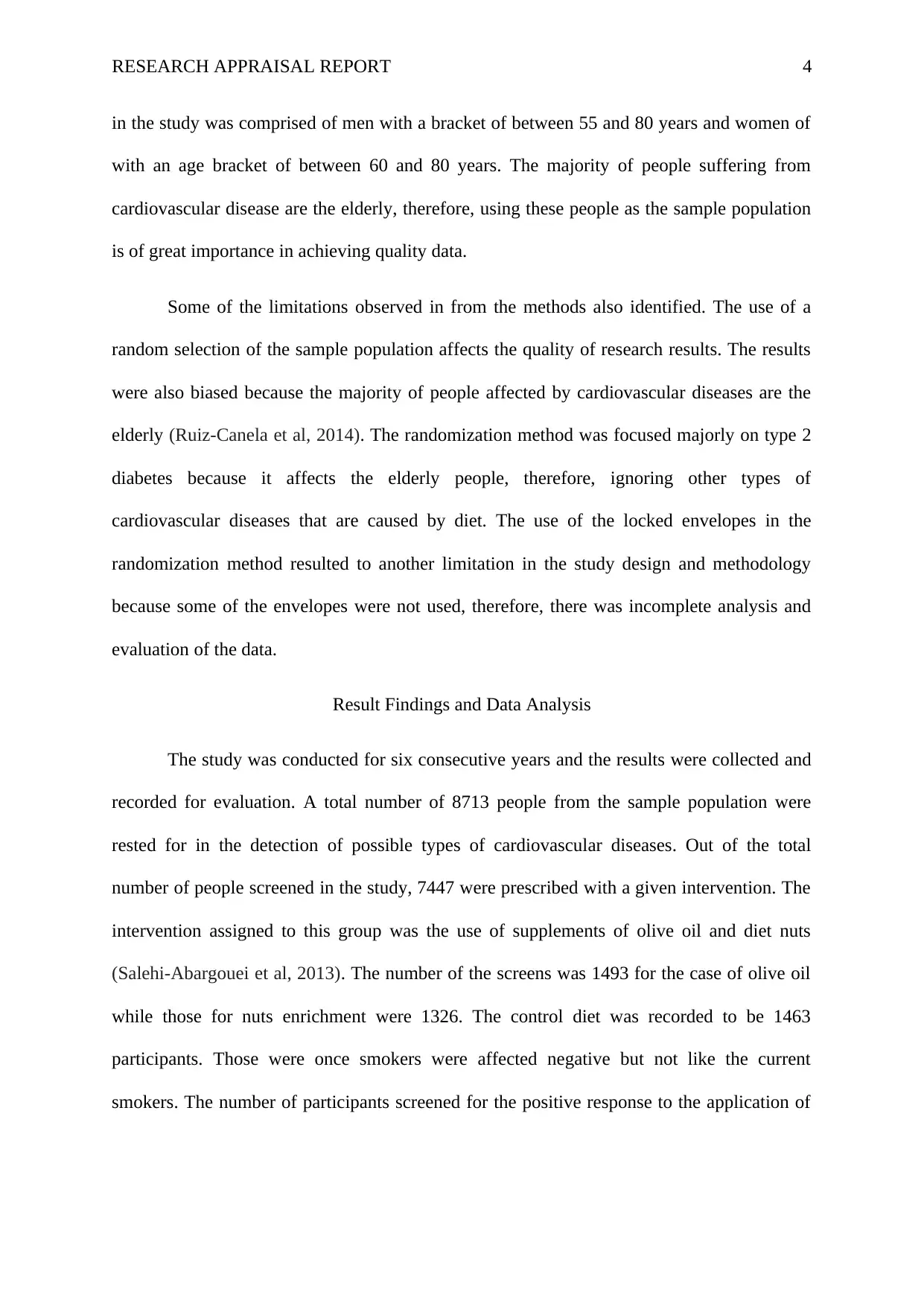
RESEARCH APPRAISAL REPORT 4
in the study was comprised of men with a bracket of between 55 and 80 years and women of
with an age bracket of between 60 and 80 years. The majority of people suffering from
cardiovascular disease are the elderly, therefore, using these people as the sample population
is of great importance in achieving quality data.
Some of the limitations observed in from the methods also identified. The use of a
random selection of the sample population affects the quality of research results. The results
were also biased because the majority of people affected by cardiovascular diseases are the
elderly (Ruiz-Canela et al, 2014). The randomization method was focused majorly on type 2
diabetes because it affects the elderly people, therefore, ignoring other types of
cardiovascular diseases that are caused by diet. The use of the locked envelopes in the
randomization method resulted to another limitation in the study design and methodology
because some of the envelopes were not used, therefore, there was incomplete analysis and
evaluation of the data.
Result Findings and Data Analysis
The study was conducted for six consecutive years and the results were collected and
recorded for evaluation. A total number of 8713 people from the sample population were
rested for in the detection of possible types of cardiovascular diseases. Out of the total
number of people screened in the study, 7447 were prescribed with a given intervention. The
intervention assigned to this group was the use of supplements of olive oil and diet nuts
(Salehi-Abargouei et al, 2013). The number of the screens was 1493 for the case of olive oil
while those for nuts enrichment were 1326. The control diet was recorded to be 1463
participants. Those were once smokers were affected negative but not like the current
smokers. The number of participants screened for the positive response to the application of
in the study was comprised of men with a bracket of between 55 and 80 years and women of
with an age bracket of between 60 and 80 years. The majority of people suffering from
cardiovascular disease are the elderly, therefore, using these people as the sample population
is of great importance in achieving quality data.
Some of the limitations observed in from the methods also identified. The use of a
random selection of the sample population affects the quality of research results. The results
were also biased because the majority of people affected by cardiovascular diseases are the
elderly (Ruiz-Canela et al, 2014). The randomization method was focused majorly on type 2
diabetes because it affects the elderly people, therefore, ignoring other types of
cardiovascular diseases that are caused by diet. The use of the locked envelopes in the
randomization method resulted to another limitation in the study design and methodology
because some of the envelopes were not used, therefore, there was incomplete analysis and
evaluation of the data.
Result Findings and Data Analysis
The study was conducted for six consecutive years and the results were collected and
recorded for evaluation. A total number of 8713 people from the sample population were
rested for in the detection of possible types of cardiovascular diseases. Out of the total
number of people screened in the study, 7447 were prescribed with a given intervention. The
intervention assigned to this group was the use of supplements of olive oil and diet nuts
(Salehi-Abargouei et al, 2013). The number of the screens was 1493 for the case of olive oil
while those for nuts enrichment were 1326. The control diet was recorded to be 1463
participants. Those were once smokers were affected negative but not like the current
smokers. The number of participants screened for the positive response to the application of
Paraphrase This Document
Need a fresh take? Get an instant paraphrase of this document with our AI Paraphraser
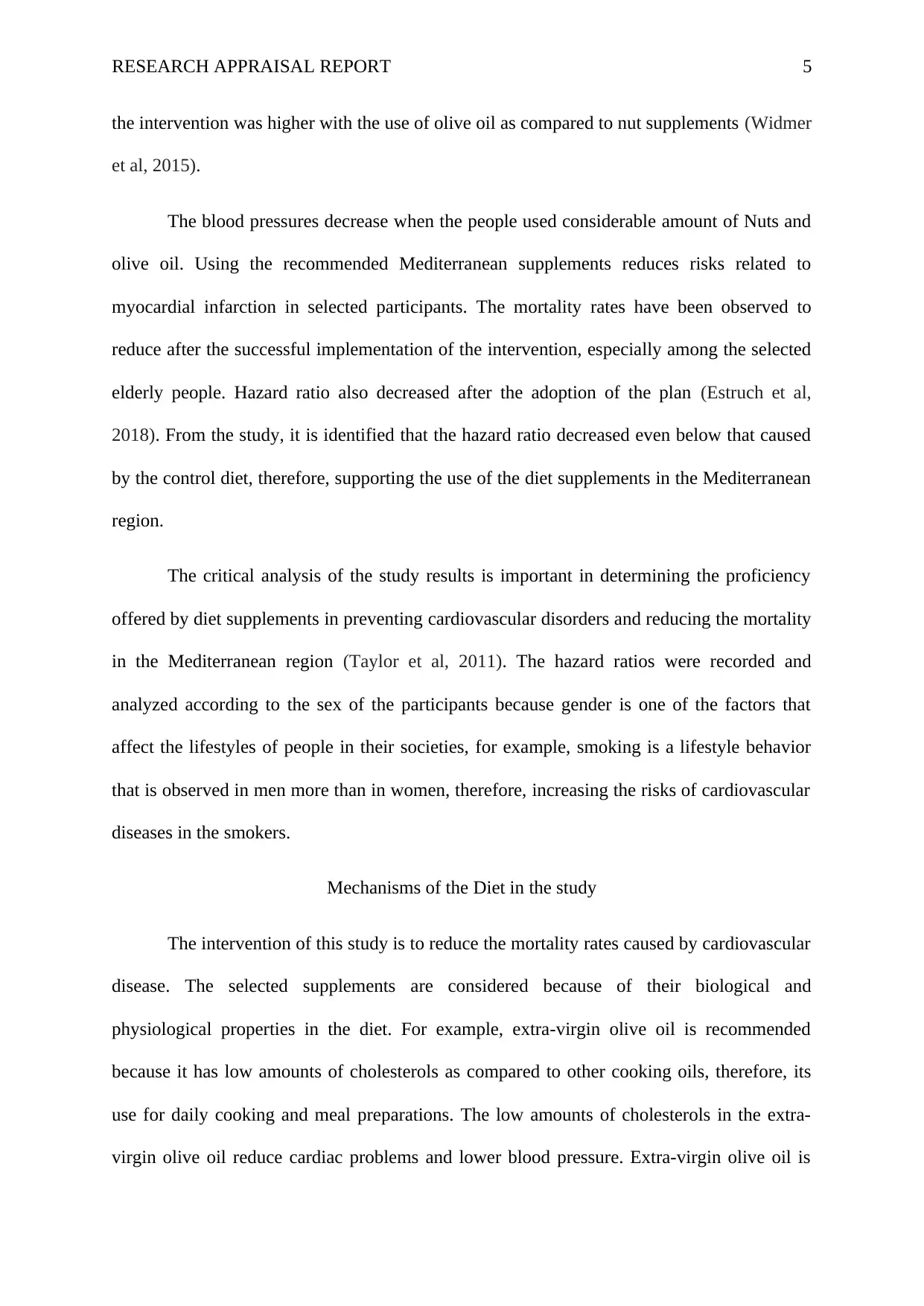
RESEARCH APPRAISAL REPORT 5
the intervention was higher with the use of olive oil as compared to nut supplements (Widmer
et al, 2015).
The blood pressures decrease when the people used considerable amount of Nuts and
olive oil. Using the recommended Mediterranean supplements reduces risks related to
myocardial infarction in selected participants. The mortality rates have been observed to
reduce after the successful implementation of the intervention, especially among the selected
elderly people. Hazard ratio also decreased after the adoption of the plan (Estruch et al,
2018). From the study, it is identified that the hazard ratio decreased even below that caused
by the control diet, therefore, supporting the use of the diet supplements in the Mediterranean
region.
The critical analysis of the study results is important in determining the proficiency
offered by diet supplements in preventing cardiovascular disorders and reducing the mortality
in the Mediterranean region (Taylor et al, 2011). The hazard ratios were recorded and
analyzed according to the sex of the participants because gender is one of the factors that
affect the lifestyles of people in their societies, for example, smoking is a lifestyle behavior
that is observed in men more than in women, therefore, increasing the risks of cardiovascular
diseases in the smokers.
Mechanisms of the Diet in the study
The intervention of this study is to reduce the mortality rates caused by cardiovascular
disease. The selected supplements are considered because of their biological and
physiological properties in the diet. For example, extra-virgin olive oil is recommended
because it has low amounts of cholesterols as compared to other cooking oils, therefore, its
use for daily cooking and meal preparations. The low amounts of cholesterols in the extra-
virgin olive oil reduce cardiac problems and lower blood pressure. Extra-virgin olive oil is
the intervention was higher with the use of olive oil as compared to nut supplements (Widmer
et al, 2015).
The blood pressures decrease when the people used considerable amount of Nuts and
olive oil. Using the recommended Mediterranean supplements reduces risks related to
myocardial infarction in selected participants. The mortality rates have been observed to
reduce after the successful implementation of the intervention, especially among the selected
elderly people. Hazard ratio also decreased after the adoption of the plan (Estruch et al,
2018). From the study, it is identified that the hazard ratio decreased even below that caused
by the control diet, therefore, supporting the use of the diet supplements in the Mediterranean
region.
The critical analysis of the study results is important in determining the proficiency
offered by diet supplements in preventing cardiovascular disorders and reducing the mortality
in the Mediterranean region (Taylor et al, 2011). The hazard ratios were recorded and
analyzed according to the sex of the participants because gender is one of the factors that
affect the lifestyles of people in their societies, for example, smoking is a lifestyle behavior
that is observed in men more than in women, therefore, increasing the risks of cardiovascular
diseases in the smokers.
Mechanisms of the Diet in the study
The intervention of this study is to reduce the mortality rates caused by cardiovascular
disease. The selected supplements are considered because of their biological and
physiological properties in the diet. For example, extra-virgin olive oil is recommended
because it has low amounts of cholesterols as compared to other cooking oils, therefore, its
use for daily cooking and meal preparations. The low amounts of cholesterols in the extra-
virgin olive oil reduce cardiac problems and lower blood pressure. Extra-virgin olive oil is
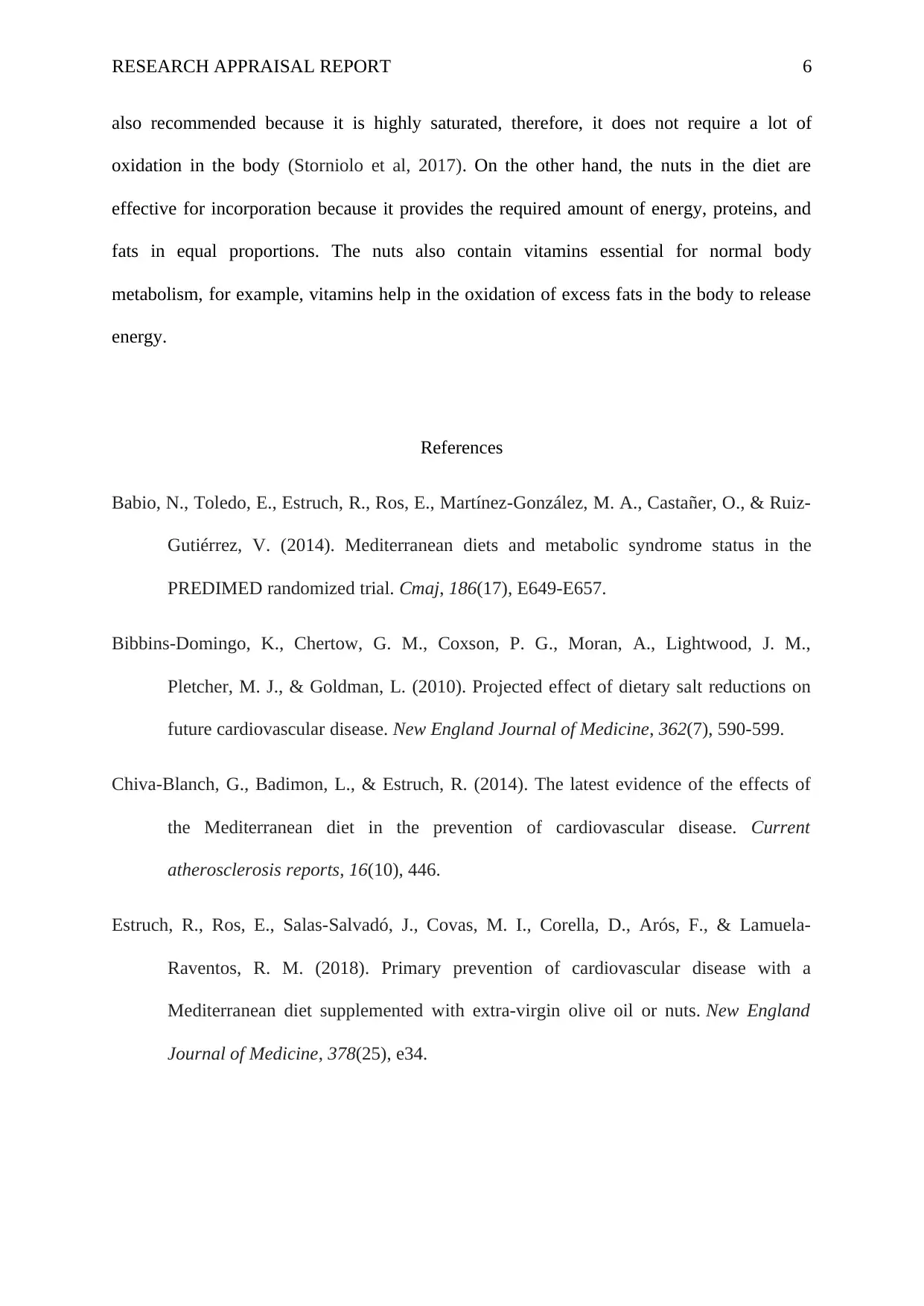
RESEARCH APPRAISAL REPORT 6
also recommended because it is highly saturated, therefore, it does not require a lot of
oxidation in the body (Storniolo et al, 2017). On the other hand, the nuts in the diet are
effective for incorporation because it provides the required amount of energy, proteins, and
fats in equal proportions. The nuts also contain vitamins essential for normal body
metabolism, for example, vitamins help in the oxidation of excess fats in the body to release
energy.
References
Babio, N., Toledo, E., Estruch, R., Ros, E., Martínez-González, M. A., Castañer, O., & Ruiz-
Gutiérrez, V. (2014). Mediterranean diets and metabolic syndrome status in the
PREDIMED randomized trial. Cmaj, 186(17), E649-E657.
Bibbins-Domingo, K., Chertow, G. M., Coxson, P. G., Moran, A., Lightwood, J. M.,
Pletcher, M. J., & Goldman, L. (2010). Projected effect of dietary salt reductions on
future cardiovascular disease. New England Journal of Medicine, 362(7), 590-599.
Chiva-Blanch, G., Badimon, L., & Estruch, R. (2014). The latest evidence of the effects of
the Mediterranean diet in the prevention of cardiovascular disease. Current
atherosclerosis reports, 16(10), 446.
Estruch, R., Ros, E., Salas-Salvadó, J., Covas, M. I., Corella, D., Arós, F., & Lamuela-
Raventos, R. M. (2018). Primary prevention of cardiovascular disease with a
Mediterranean diet supplemented with extra-virgin olive oil or nuts. New England
Journal of Medicine, 378(25), e34.
also recommended because it is highly saturated, therefore, it does not require a lot of
oxidation in the body (Storniolo et al, 2017). On the other hand, the nuts in the diet are
effective for incorporation because it provides the required amount of energy, proteins, and
fats in equal proportions. The nuts also contain vitamins essential for normal body
metabolism, for example, vitamins help in the oxidation of excess fats in the body to release
energy.
References
Babio, N., Toledo, E., Estruch, R., Ros, E., Martínez-González, M. A., Castañer, O., & Ruiz-
Gutiérrez, V. (2014). Mediterranean diets and metabolic syndrome status in the
PREDIMED randomized trial. Cmaj, 186(17), E649-E657.
Bibbins-Domingo, K., Chertow, G. M., Coxson, P. G., Moran, A., Lightwood, J. M.,
Pletcher, M. J., & Goldman, L. (2010). Projected effect of dietary salt reductions on
future cardiovascular disease. New England Journal of Medicine, 362(7), 590-599.
Chiva-Blanch, G., Badimon, L., & Estruch, R. (2014). The latest evidence of the effects of
the Mediterranean diet in the prevention of cardiovascular disease. Current
atherosclerosis reports, 16(10), 446.
Estruch, R., Ros, E., Salas-Salvadó, J., Covas, M. I., Corella, D., Arós, F., & Lamuela-
Raventos, R. M. (2018). Primary prevention of cardiovascular disease with a
Mediterranean diet supplemented with extra-virgin olive oil or nuts. New England
Journal of Medicine, 378(25), e34.
⊘ This is a preview!⊘
Do you want full access?
Subscribe today to unlock all pages.

Trusted by 1+ million students worldwide
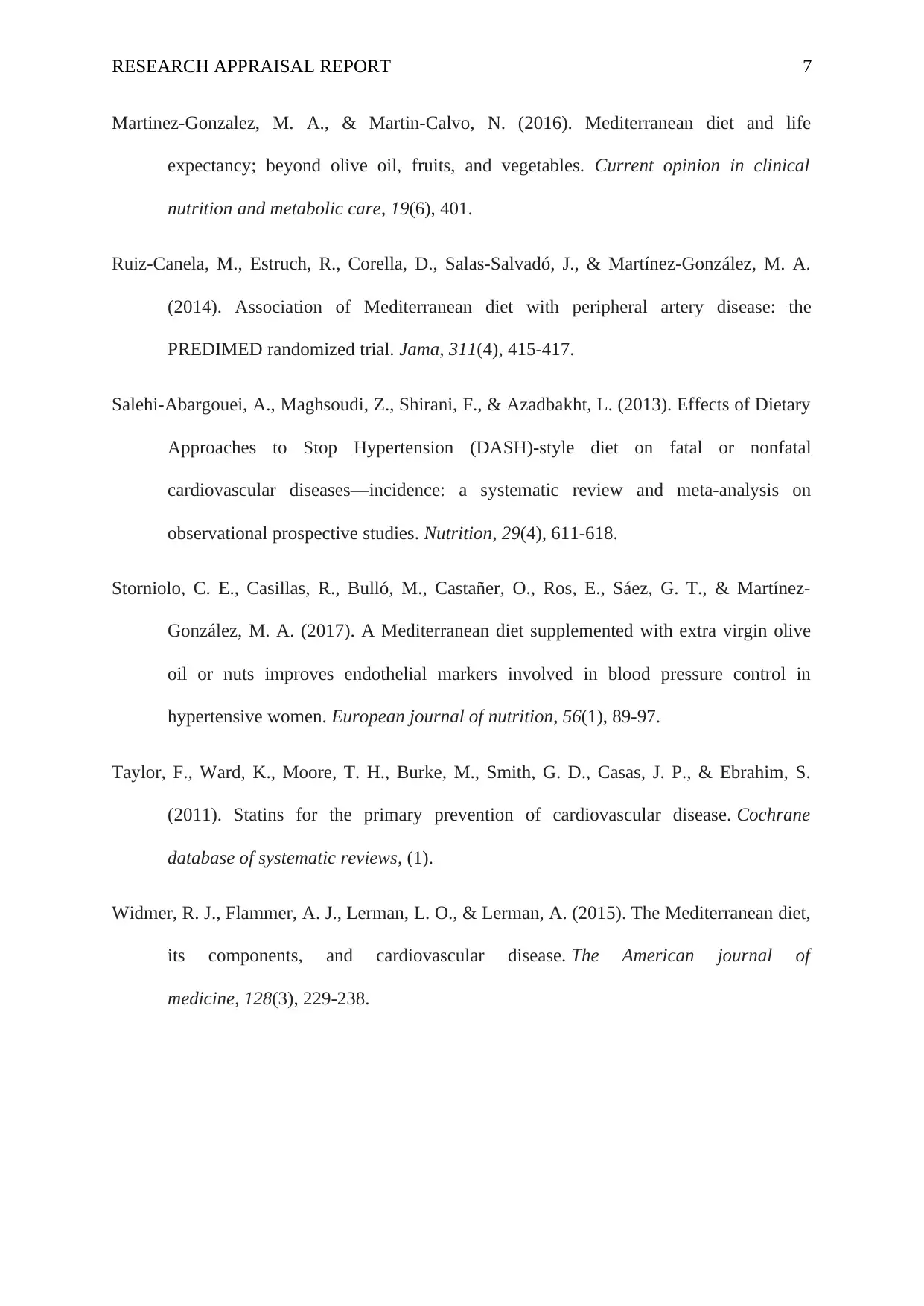
RESEARCH APPRAISAL REPORT 7
Martinez-Gonzalez, M. A., & Martin-Calvo, N. (2016). Mediterranean diet and life
expectancy; beyond olive oil, fruits, and vegetables. Current opinion in clinical
nutrition and metabolic care, 19(6), 401.
Ruiz-Canela, M., Estruch, R., Corella, D., Salas-Salvadó, J., & Martínez-González, M. A.
(2014). Association of Mediterranean diet with peripheral artery disease: the
PREDIMED randomized trial. Jama, 311(4), 415-417.
Salehi-Abargouei, A., Maghsoudi, Z., Shirani, F., & Azadbakht, L. (2013). Effects of Dietary
Approaches to Stop Hypertension (DASH)-style diet on fatal or nonfatal
cardiovascular diseases—incidence: a systematic review and meta-analysis on
observational prospective studies. Nutrition, 29(4), 611-618.
Storniolo, C. E., Casillas, R., Bulló, M., Castañer, O., Ros, E., Sáez, G. T., & Martínez-
González, M. A. (2017). A Mediterranean diet supplemented with extra virgin olive
oil or nuts improves endothelial markers involved in blood pressure control in
hypertensive women. European journal of nutrition, 56(1), 89-97.
Taylor, F., Ward, K., Moore, T. H., Burke, M., Smith, G. D., Casas, J. P., & Ebrahim, S.
(2011). Statins for the primary prevention of cardiovascular disease. Cochrane
database of systematic reviews, (1).
Widmer, R. J., Flammer, A. J., Lerman, L. O., & Lerman, A. (2015). The Mediterranean diet,
its components, and cardiovascular disease. The American journal of
medicine, 128(3), 229-238.
Martinez-Gonzalez, M. A., & Martin-Calvo, N. (2016). Mediterranean diet and life
expectancy; beyond olive oil, fruits, and vegetables. Current opinion in clinical
nutrition and metabolic care, 19(6), 401.
Ruiz-Canela, M., Estruch, R., Corella, D., Salas-Salvadó, J., & Martínez-González, M. A.
(2014). Association of Mediterranean diet with peripheral artery disease: the
PREDIMED randomized trial. Jama, 311(4), 415-417.
Salehi-Abargouei, A., Maghsoudi, Z., Shirani, F., & Azadbakht, L. (2013). Effects of Dietary
Approaches to Stop Hypertension (DASH)-style diet on fatal or nonfatal
cardiovascular diseases—incidence: a systematic review and meta-analysis on
observational prospective studies. Nutrition, 29(4), 611-618.
Storniolo, C. E., Casillas, R., Bulló, M., Castañer, O., Ros, E., Sáez, G. T., & Martínez-
González, M. A. (2017). A Mediterranean diet supplemented with extra virgin olive
oil or nuts improves endothelial markers involved in blood pressure control in
hypertensive women. European journal of nutrition, 56(1), 89-97.
Taylor, F., Ward, K., Moore, T. H., Burke, M., Smith, G. D., Casas, J. P., & Ebrahim, S.
(2011). Statins for the primary prevention of cardiovascular disease. Cochrane
database of systematic reviews, (1).
Widmer, R. J., Flammer, A. J., Lerman, L. O., & Lerman, A. (2015). The Mediterranean diet,
its components, and cardiovascular disease. The American journal of
medicine, 128(3), 229-238.
1 out of 7
Your All-in-One AI-Powered Toolkit for Academic Success.
+13062052269
info@desklib.com
Available 24*7 on WhatsApp / Email
![[object Object]](/_next/static/media/star-bottom.7253800d.svg)
Unlock your academic potential
Copyright © 2020–2025 A2Z Services. All Rights Reserved. Developed and managed by ZUCOL.
